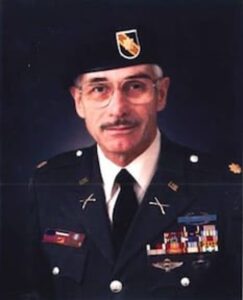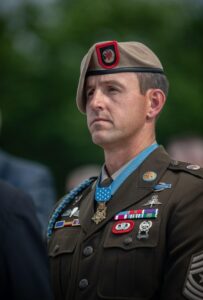
Rank: Corporal
Organization: U.S. Army
Company: Company I
Division: 8th Cavalry Regiment, 1st Cavalry Division
Conflict: Korean 07/23/1950 – 04/20/1953
Date of Issue: 09/23/2005
Medal Presented By: President George W. Bush
“In the years since Abraham Lincoln signed into law the bill establishing the Medal of Honor, we have had many eloquent tributes to what this medal represents. I like Ted’s description. He calls it “the highest honor of the best country in the world.” And today, a grateful America bestows this award on a true son of liberty.” – President George W. Bush
Today is International Holocaust Remembrance Day and as we remember all the victims and survivors of the holocaust, we honor the incredible story of Medal of Honor Recipient Corporal Tibor Rubin. He bravely served during the Korean War, risking his life several times, but his heroic tale did not start there.
Corporal Rubin was born in Paszto, Hungary to Ferenc and Rosa Rubin. His community was home to over 100 Jewish families, including his own. In March of 1944, mere days before the Nazi occupation of Hungary, Rubin’s parents sent him with a group attempting to reach Switzerland. According to “Single Handed,” a book by David Cohen detailing Rubin’s life, the group was captured before they reached the border. Rubin, age 14 at the time, was sent to Austria and sent to the notorious Mauthausen concentration camp, one of the largest labor camps in German-controlled Europe. Rubin was held for 14 grueling months before the camp was liberated by the United States Army on May 5, 1945. Rubin credited Army medics for saving the lives of the camp survivors and was quoted saying, ““I promised the good Lord that if I get out of here alive, I’d become a G.I. Joe, to give back something.”
Corporal Rubin came to the United States in 1948, arriving penniless and barely speaking English. He wanted to show his appreciation to the Americans who liberated him from the Mauthausen concentration camp in Austria. By 1950 he had enlisted in the United States Army and volunteered for service in the Korean War, where he served as a rifleman.
During his service, his unit was called to retreat to the Pusan Perimeter, but Corporal Rubin was assigned to stay behind to keep open the Taegu-Pusan Road, a vital link used by withdrawing American troops. During the ensuing battle, overwhelming numbers of North Korean troops assaulted a hill defended solely by Corporal Rubin. He alone defended the area for 24-hours, single-handedly slowing the enemy advance and allowing his fellow soldiers to withdraw successfully.
Following the breakout from the Pusan Perimeter, his regiment moved northward and advanced into North Korea. During the advance, he helped capture several hundred North Korean soldiers. On October 30, 1950, Chinese forces attacked his unit at Unsan, North Korea, during a massive nighttime assault. That night and throughout the next day, he manned a machine gun at the south end of the unit’s line after three previous gunners passed. He continued to man his machine gun until he was out of ammunition. His determined stand slowed the pace of the enemy advance in the area, permitting the rest of his unit to retreat southward.
As the battle continued, Corporal Rubin was severely wounded and captured by the Chinese. He was taken as a P.O.W. to a camp in North Korea. The Chinese offered to return him to his native Hungary, but Corporal Rubin refused, disregarding his own personal safety. Corporal Rubin immediately began sneaking out of the camp at night in search of food for his comrades. He broke into the enemy’s food storehouses and gardens, risking certain torture or death if caught. Corporal Rubin provided not only food to the starving soldiers, but also desperately needed medical care and moral support for the sick and wounded of the P.O.W. camp. Corporal Rubin remained in the camp for 30 months.
Today, we remember Corporal Rubin’s selfless bravery and admire his unwavering determination. His actions saved countless lives and filled his fellow soldiers with hope and resolve during the 30 months of imprisonment. We also remember his father, who died in the Buchenwald concentration camp, and his mother and sister, who died at Auschwitz.
In 2002, President Bush ordered a review for the records of 137 Jewish veterans to examine past nominating practices. It was revealed that Corporal Rubin’s Sergeant deliberately ignored orders from his own superiors to prepare the appropriate nominating paperwork. Corporal Rubin was awarded his Medal of Honor by President George W. Bush in 2005, 55 years after his actions.

Navigating the Darkest Night | The Courageous Leadership of Rear Admiral Bruce McCandless
Recipient: Bruce McCandless Branch: U.S. Navy Combat: World War II Sometimes fate has a way of showing us exactly where we need to be and


